Liberia
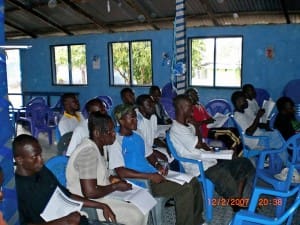 In its first five years, the Liberian Initiative supported the establishment of a mediation service for and by refugees in a refugee camp, enhanced the capacity for mediation among a wide range of Ghanaian officials, facilitated the safe re-integration of 75 ex-combatants in community following vocational training and psychosocial support; and brought together women of nine tribes to reweave the social fabric in their fractured society.
In its first five years, the Liberian Initiative supported the establishment of a mediation service for and by refugees in a refugee camp, enhanced the capacity for mediation among a wide range of Ghanaian officials, facilitated the safe re-integration of 75 ex-combatants in community following vocational training and psychosocial support; and brought together women of nine tribes to reweave the social fabric in their fractured society.
The team worked with local partners to increase the coping skills of at-risk youth – motorcycle taxi drivers known as Pen Pen boys. MBBI also worked toward increasing trust and cohesion among youth, the community, and the police—across the country and in regions spanning Liberia’s borders.
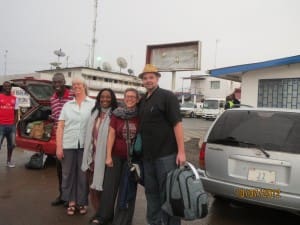 Board Liaison: Dave Joseph
Board Liaison: Dave Joseph
Project Team Leaders: John Lewis Moore, Ginny Morrison, Prabha Sankaranarayan
Project Team: Arthur Finegold, Barbara Graettinger, Mary Jo Harwood, LaVerne Baker Hotep, Marc Jorgensen, Tracy Kern, Donnyen Kofa, Steve Lancken (with many thanks to the more than 35 previous team contributors)
Partners:
- Network for Empowerment and Progressive Initiatives (NEPI) – Formerly National Ex-Combatant Peacebuilding InitiativesReintegration and community services
- Peace Building Resource Center – Peacebuilding research and interventions
- Public Conversations Project (PCP) – Dialogue training and conflict resolution capacity-building
- Pump Aid – Training to install and maintain appropriate technology waterpumps and toilets
- RECEIVE – Peacebuilding and trauma healing
- Society Mission Africa Technical Vocational Training Center – Vocational training in construction trades and tailoring
- University of Ghana, Legon – psycho-social services
- University of Liberia, Kofi Annan Institute for Conflict Transformation – Graduate level instruction and peacebuilding advice
- Women in Peace Network (WIPNET) – Alliances across
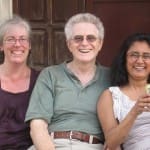 borders and between communities and police, early warning and early response, gender-based violence reduction
borders and between communities and police, early warning and early response, gender-based violence reduction - Youth Crime Watch of Liberia – Youth-oriented peacebuilding
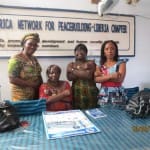 The Liberian Initiative began its work with Liberians in 2007 and was committed to rebuilding personal and systemic capacity to coexist peacefully. The Initiative established relationships in communities and with a wide range of local and international partners, from all sectors from governmental to grass roots levels. It coordinated activities to increase the capacity for skillful communication, cooperation, and collaboration among Liberians—as well as the NGOs and government agencies serving them.
The Liberian Initiative began its work with Liberians in 2007 and was committed to rebuilding personal and systemic capacity to coexist peacefully. The Initiative established relationships in communities and with a wide range of local and international partners, from all sectors from governmental to grass roots levels. It coordinated activities to increase the capacity for skillful communication, cooperation, and collaboration among Liberians—as well as the NGOs and government agencies serving them.
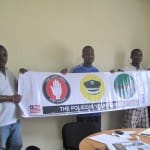 The Initiative adjusted its work to the happy reality that Liberia had moved from emergency to development. The Initiative formulated plans to increase the conflict competencies of youth-centered NGOs, much-criticized youth who drive motorcycle taxis – many of whom were ex-combatants, college and secondary school youth, and women’s NGOs. The Initiative hoped to work with women’s NGOs to create alliances across country borders to reduce violence cycles in the region.
The Initiative adjusted its work to the happy reality that Liberia had moved from emergency to development. The Initiative formulated plans to increase the conflict competencies of youth-centered NGOs, much-criticized youth who drive motorcycle taxis – many of whom were ex-combatants, college and secondary school youth, and women’s NGOs. The Initiative hoped to work with women’s NGOs to create alliances across country borders to reduce violence cycles in the region.
Prior to this, the Liberian Initiative and its consortium of Liberian partners worked with rural women of nine tribes and two religions. The Initiative offered a program combining:
- training Liberian peacebuilders in dialogue methods, resiliency building, and training
 techniques
techniques - a series of dialogues among the women participants
- a series of dialogues in the community
- a series of trainings in the community to increase understanding of trauma, its effect on conflict prevention/resolution, and ways of responding supportively
- training in sustainable agriculture techniques and joint farming and marketing activity
- mentoring
That women’s project grew out of initial work at the invitation of a resident of Ghana’s largest refugee camp. There, MBBI trained and advised residents in setting up a community and peer mediation service.
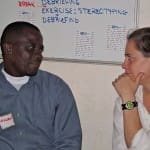 MBBI then worked with former child soldiers alongside numerous Liberian, Ghanaian and international partners. Research by the UN, the US Institute of Peace, and others showed that one of the critical factors of post-conflict peace was the employment and reintegration of former combatants.
MBBI then worked with former child soldiers alongside numerous Liberian, Ghanaian and international partners. Research by the UN, the US Institute of Peace, and others showed that one of the critical factors of post-conflict peace was the employment and reintegration of former combatants.
The program provided: mentoring, teambuilding and conflict resolution training, construction skills, and psychological counseling to begin healing and rebuilding participants’ identity as community members. The project worked with receiving communities to build acceptance, and the group has repatriated and safely reintegrated into society.
The invitations grew, as MBBI heard from community members and leaders, the largest university, government agencies, and local NGOs and churches. The MBBI team members made 13 assessment and intervention visits.
Other Resources
- Full Executive Summary – 2009
- The Liberian Initiative: Giving a Chance at Life – A letter-size, folded brochure about the 7th S.M.A. Graduation at Buduburam Refugee Settlement.
- Arrival of the elephant pump trumpets a great day for Paulo – The Times (London, UK) correspondent joins a Pump Aid team as they bring clean water to an African village.
- A Chance at Life – A documentary about MBBI and its largest international project the Liberian Initiative.
